Dear Friends,
The first experiment of Russians Meet Mainstream America! (RMMA) exceeded our expectations beyond what we could have expected. Difficult questions were asked and honest, insightful answers were given by both Americans and Russians.
The four Russian women who participated were authentic and grateful for the opportunity to be a bridge between our two nations. In each city volunteers worked as though they were in “for-pay” positions. Groups of open-minded local citizens were interested in each question and answer–-attention was rapt. Schools, universities and interested young people asked for contacts with Russian youths. We arrived late at one event expecting an audience of 30 … and found a hundred or more Americans waiting for us. SMMA (the parent program in 1988/89) never attracted such immediate interest, even in its final stages!
During this travel period my usual email reporting was sporadic, please excuse if I didn’t answer requests. I hardly had time to settle travel and urgent matters. The only snag for RMMA was the lock-down tension in Washington, D.C. and our inability to schedule Congressional appointments previous to our travel there. Mentioning “Russia or Russians” in my requests seemed to be a non-starter in each office. The latest strike on Syria may have been anticipated. In any case, it made us realize America needs many such programs like RMMA from here on.
We at CCI are focused on increasing citizen participation to offset dangerous levels of misinformation in mainstream media and the Congress; this includes Americans traveling to Russia to investigate for themselves what is happening on ground there, different types of exchanges, and non-official Russians traveling across the United States to discuss issues and insights with numbers of American citizens. For newcomers to our CCI list, I’ll repeat a bit of information covered previously.
Travel to Russia: We have exploratory trips to Russia scheduled in May and September, with more to follow starting in January of 2019.
Russians Meet Mainstream Americans! (RMMA) is a repeat of CCI’s program, Soviets Meet Middle America! (SMMA), that brought us into national prominence in 1988-89. Due to Gorbachev’s “glasnost” we brought micro-delegations of four Soviet citizens (non-party members) of our choice to 264 American cities where they slept in American homes and had meals around family tables. They spoke to numerous groups to discover whether we/they were enemies or not. The enemies met across the United States and found common ground. SMMA was an instant success! Soviets went home to the USSR where newspapers and state TV channels covered reports of their trips across America. U.S. media printed many hundreds of newspaper articles which for decades we have proudly kept in binders. Soviets were on dozens of TV news shows across America during those two years. SMMA destroyed decades of stereotypes in those short visits to multiple American cities –– which we hope helped with the demise of communism.
Obviously a similar program is greatly needed today.
While planning the March 2018 startup of RMMA, I saw an article written by VIP Washington insider Paul Saunders of the Institute for National Interest. It made a strong case for “Bottom-up Diplomacy” when top-down diplomacy is non-existent. This greatly encouraged me. At least one VIP in Washington understands that a different type of diplomacy is needed today. I sent the Saunders’ article around the country.
RMMA’s first experimental micro-delegation brought four Russian women from four regions of Russia to the United States in March/April: Lena Novomeiskaya from Yekaterinburg, Natasha Ivanova from Krasnodar, Tatyana Bukarina from Yalta in Crimea and Elena Ivanova from St.Petersburg. Their ages range from 40 to 59. Two had traveled to the U.S. numerous times as interpreters for CCI’s business training programs for Russia’s young entrepreneurs. The other two had traveled here on other programs. They respect and genuinely care for both peoples and both countries. In the future they will interview and prepare other Russian applicants for RMMA micro-delegations.
These women embarked upon a RMMA travel schedule that would take down the heartiest of international travelers. From their far-out regions they flew to Moscow. There they boarded a Lufthansa plane and flew to Frankfurt, Germany. After a layover, they then flew across the ocean to Atlanta, Georgia.
ATLANTA AREA:
The foursome landed at the huge Atlanta airport on March 20th — and the following morning they had all-day classroom meetings scheduled at a local high school. (No time for jet lag.) RMMA organizers Don and Julie Chapman kept the women in public meetings day after day… into the evenings. Americans and Russians were open, accepting and learned from each others’ points of view. Local Georgians wrote thoughts about these meetings in a “comments book.” Students wrote notes also. One said, “Thank you so much. You brought us new knowledge that is the key to bringing our nations together. We appreciate your dedication!” A local business “icon” wrote, “It’s very important for our countries and our people to get to know each other, even to do business with each other!” For five days the women spoke and gathered insights at official meetings, businesses, churches, potluck dinners, large evening home discussion events and even interacted with Americans at a swank Atlanta black-tie event. All too soon they flew out to Dallas where another rigorous schedule awaited them.
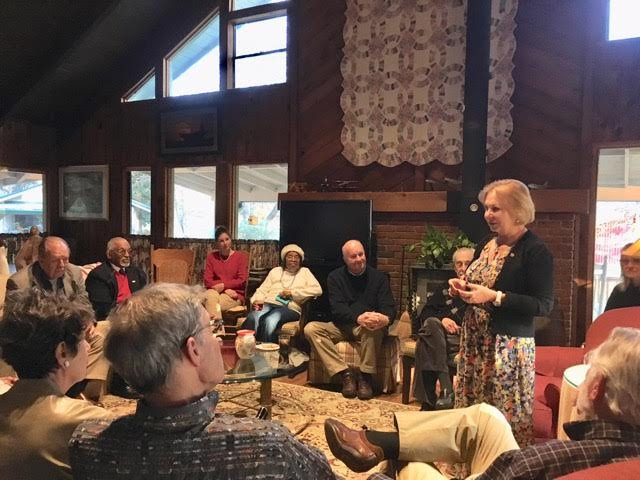
FORT WORTH:
The RMMA women landed at DFW and went directly to Fort Worth, Texas where they were hosted by officers of Sister Cities International for 24 hours. Official and high-level home meetings were waiting for them. Fort Worth Rotarians were also involved in the discussions. Mae Ferguson, a well-known Fort Worth supporter of VIP events was the organizer. Fort Worth citizens have a long history with Moscow since this was the hometown of young pianist Van Cliburn, winner of the first-ever Tchaikovsky Competition in Moscow in April 1958. They are still involved with the competitions being held in Russia. Our RMMA women were stunned by the beauty of downtown Fort Worth and the Bass Performance Hall where massive angelic figures clasped music horns high up on the regal building’s exterior. The Russians, being classically oriented, were delighted to meet the people of Fort Worth with whom they had opportunity to discuss U.S.-Russia issues.
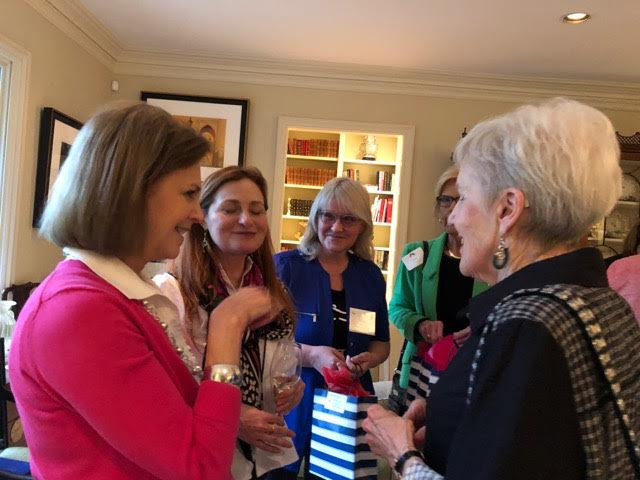
DALLAS:
Dallas organizer Sylvia Demarest, a well-known trial lawyer, enlisted and ran a superlative menu of meetings with the help of a fleet of Dallas volunteers. They hosted and transported the RMMA women across the metroplex in different directions for appointments. Being a lawyer accustomed to thorough reports, Sylvia sent pages describing the RMMA events in Dallas. A small portion follows:
Final Dallas RMMA Report: March 27-30, 2018
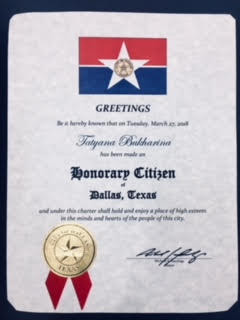
Dallas volunteers coordinated the following events for our RMMA visitors: two evening forums, three roundtable coffees, one large event with a Russian at each table, one potluck dinner, visits to four colleges/universities, interactions with seven different classes at educational institutions, one Interfaith luncheon at Dallas’ downtown Thanksgiving Square and one Lions Club luncheon. An evening event at SMU’s Meadows Museum included serious music along with a discussion about Russian art, literature, and music. Two members of the Dallas City Council welcomed our visitors. Councilman Scott Griggs at the Hitt Auditorium and Councilwoman Sandy Greyson at Meadows Museum hosted the event. Dallas’ Mayor and the Dallas City Council proclaimed our RMMA delegates as honorary Citizens of Dallas, and Councilwoman Greyson presented them with official proclamations. Our RMMA visitors lived with local Dallas families and volunteers drove them to the numerous events.
Sylvia Demarest reports, “It’s difficult to sufficiently thank our four new Russian friends. Everyone they met commented on how well spoken, educated and intelligent they are. They conducted themselves with dignity and integrity. They wowed us with their knowledge of both Russian and American literature and history. Being courteous and polite, they patiently answered all of our questions. Their command of the English language was better than many Americans. Perhaps the most interesting thing about them was a sense of authenticity when discussing both their own country and America. These ordinary Russians took time from their families and businesses to advance the cause of greater understanding and peace between our two countries. To sum RMMA up: all of the Dallasites they met admired them and were sorry to see them leave.”
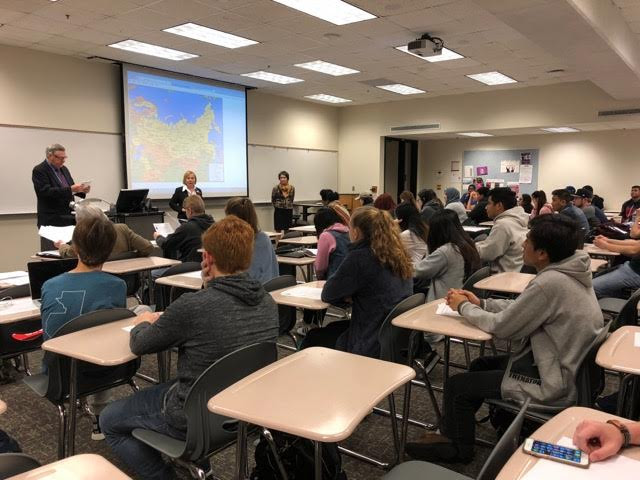
Their visits encouraged a number of Dallas college students to want to visit Russia. Several inquired about student exchange programs between Russian educational institutions and U.S. colleges. They asked if CCI would consider initiating a U.S. College Student Exchange Program with a Russian educational institution using DFW area students as the pilot program? It remains to be investigated.
SAN FRANCISCO BAY AREA:
The RMMA women took and asked questions at a Rotary dinner in Cupertino, CA (home of Apple Computer and heart of Silicon Valley). Cupertino was the first-ever city to host SMMA back in 1988. Joe and Ann Cleaver organized both 1988 and 2018 meetings. They are still in touch with some of the Soviets who came to them 30 years ago.
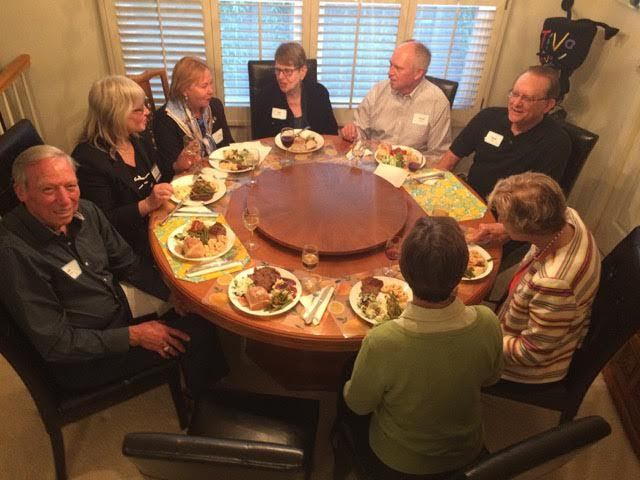
Other Bay Area discussions were held in Los Altos, Petaluma,Walnut Creek, Orinda, Moraga, Half Moon Bay and San Francisco. Attendees were Apple managers, businessmen and women, professors, teachers, former Palo Alto High School principal, two East Bay Rotary clubs in Moraga and Orinda, roundtables at the United Religions Initiative and the Institute of Noetic Sciences. An older Orinda Rotarian exclaimed that RMMA’s women gave the most important presentation that their club has experienced in the past 37 years! Americans attending these discussions ranged from a dozen to a hundred or more persons.
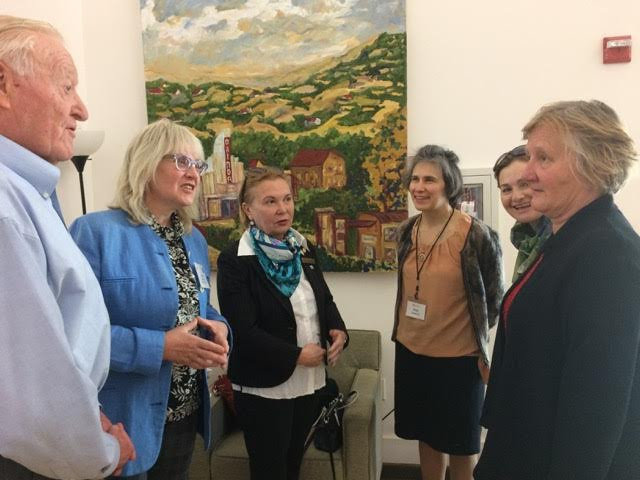
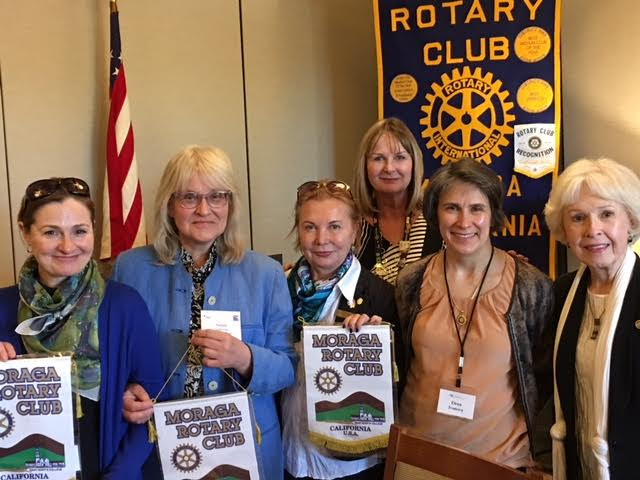
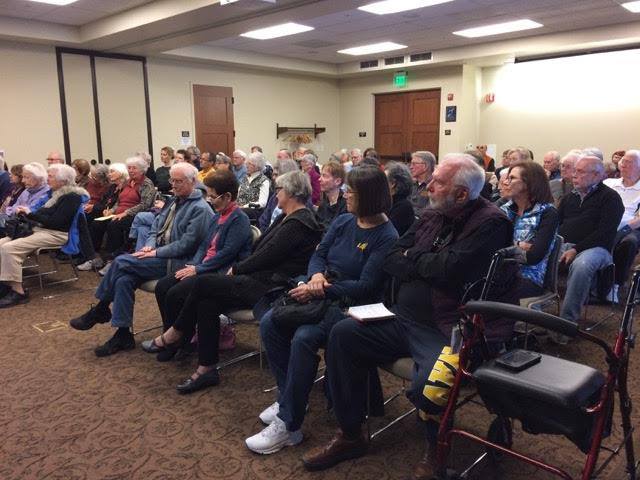
How to describe the Americans who attended these 2018 meetings?
On the whole, they were professionals, well-educated, some not too well informed on U.S.-Russia issues, people who get much of their news from the mainstream media. They have active lives, travel a lot, clearly most are local community builders and contributors. They serve good causes, but not U.S.-Russia related. They were perfect audiences with whom to communicate. They appeared quite interested in the current U.S.-Russia topics. A few seemed intellectually or politically driven, but most were eager to get basic information about Russia today and to learn if there is a way to live on the same planet without a nuclear war.
After years of Americans ignoring the dire “nuclear war” issues, this topic has all-of-the-sudden become real and deeply worrisome to many Americans––likely due to the current nuclear challenge with North Korea and the potential of war in Syria that could turn nuclear with Russia. The latter made clear the stakes involved if U.S. missiles hit Russia, Russian troops or hit a partner state like Syria for regime change. All of this peaked when we were in Washington. No wonder it was near impossible to get meetings prior to and during the lead-up of this showdown.
None in our meetings across these cities were indifferent to our RMMA women. A few introduced themselves by giving them hugs and warm welcomes. Others left them with well wishing. Would they instinctively do the same with other nationalities, I wonder? If not, why?
What can we make of this response to Russians from Russia in our midst?
We have lots of Russians living permanently in the United States with whom there seems no special affinity. But there was something special about these women who volunteered to come here as personal emissaries, to listen, discuss and learn about the difficult issues between our two countries.
Is there some special chemistry between American and Russian personalities? Since the 80’s Russians have pointed out to us that we two peoples have the same temperaments, humor and sensitivities. They have also ventured that the Brits are a little too staid and stuffy for them, Germans a little too stiff, French a little too regal…but Americans, they say they always get along with us!
This is likely so. Whether Americans are visiting in Russia or Russians are visiting in our country, we seem to instinctively get to warmth and goodwill with each other.
Then why have our nations had such enmity over the past hundred years?
Why do most of our current leaders and media demonize everything Russian?
Why do our newspapers, magazines and TV channels never mention anything good about Russia?
Why are there so many unsubstantiated rumors about Russia and Putin?
Do they fear that Russia or China, or both, will take our #1 place in the world of nations?
My belief, based on keeping ear-to-the-ground across Russia for three decades, is …
Russians admit they learned very painful lessons from Soviet power that sought world domination. Since 1990 they have reiterated that Russia will never again seek to be #1 in the world.
Russians believe a “multipolar” world is the only governance that will work in the future.
They believe a group of well-intentioned, cooperative nations working together is the only hope for the extremely complex problems our world faces in the 21st century and beyond.
Ask Russians, travel there, email them, discuss this topic with them.
Learn their opinions regarding unipolarity or multipolarity.
This topic will be explored in our coming 2018 trips to Russia.
Few talk about these issues today, but it seems they may drive top-end politics in the world right now.
It is extremely important to get this issue out in the open.
More to follow,

Sharon Tennison
Center for Citizen Initiatives
PS: Friends, this report brings good news! Americans and Russians across these states we visited are open to understanding multiple points of views about one another. They are not interested in demonizing each other. Certainly they both want to avoid conflict of any sort between our two nations.
I have to assume that what happened in Atlanta, Fort Worth, Dallas and the Bay Area, would likely also happen in our Eastern, Western, Northern and Central states. This means that our American people haven’t all swallowed the information that comes from newspapers and television — or if they have, there’s a thin membrane that separates what they hear and read and how they feel if they meet and converse with live Russian citizens. Further that the membrane can be easily pierced by direct experience.
Please give the link for this report to dozens of your friends, colleagues, business partners and family members. Our circulation is minuscule compared to TV and the New York Times. However, you can give this information wings so others will have a larger understanding of what needs to emerge in U.S.-Russia relations.
